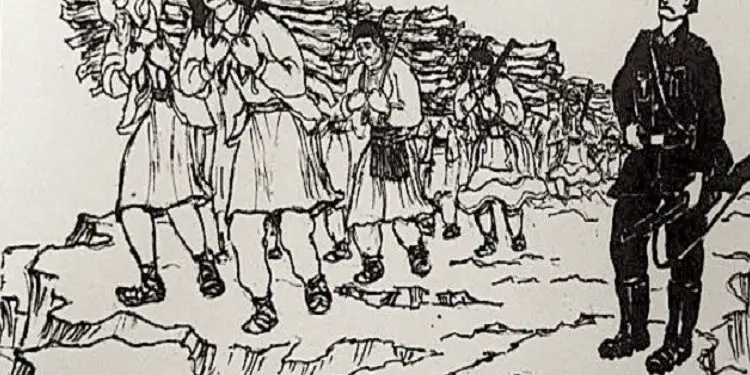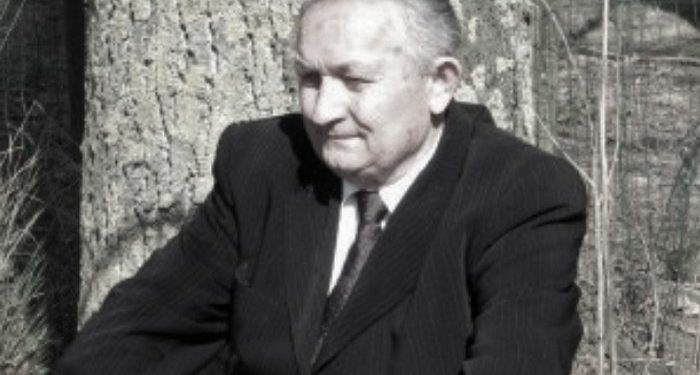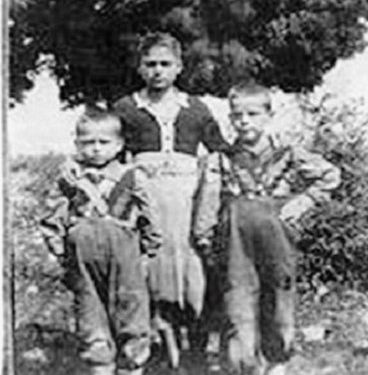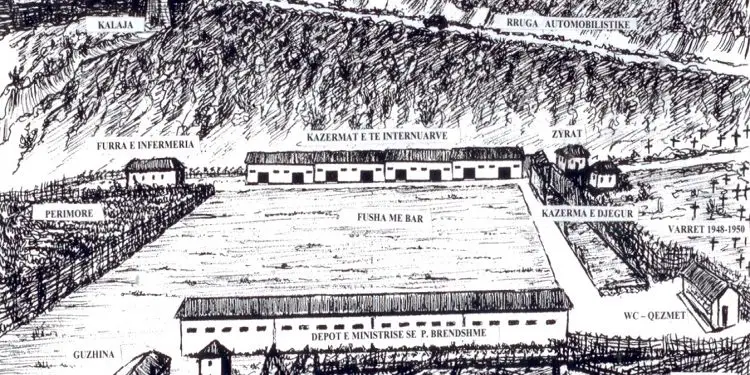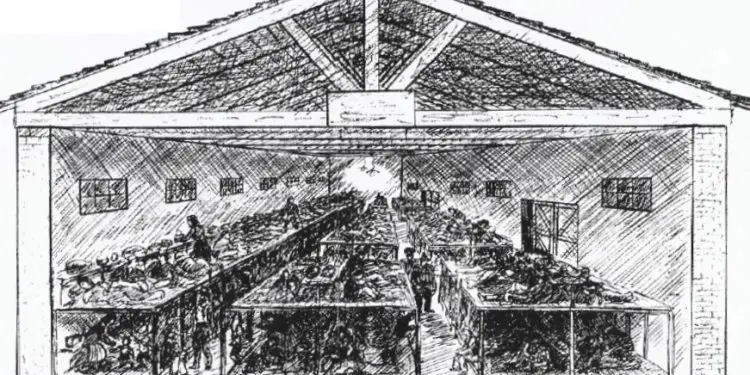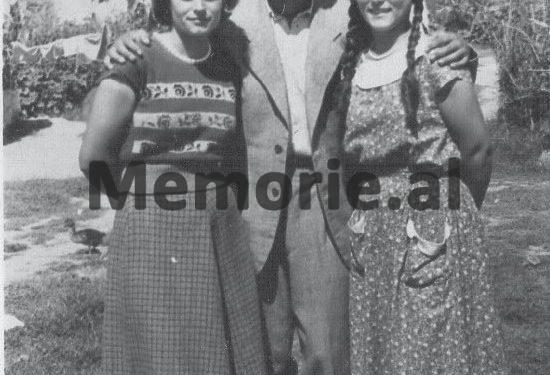From SHEFQET DOBRA
Part One
Memorie.al / People gathered like cattle, from all over the region, were gathered in four large barracks, in a former army unit, – in Bënçë of Tepelena, which they called: “the “internment” camp,” while in the letters we sent or received, it was known as an army unit, because the address was: Unit number (…) Tepelena. In fact, this was not an internment camp, nor an army unit; it was exactly a prison, because it was surrounded by barbed wire, guarded by armed guards, where they were counted every morning and evening, they went to work guarded by armed police. But not to know that there was a prison there, where there were: men and women, old and sick, infants and older children, who went to school, came and went, guarded by police. They should not have known that there was such a prison.
There were four large barracks, with four rows of beds, with two large double doors, below the city of Tepelena, next to the Ali Pasha fortress. This former military unit, – apparently, the Italians before they left – had mined the field within the encirclement and while moving through that field, from time to time, they would shoot so that one would explode under our feet. Many young and old, from these mines, received the “maximum punishment”, without trial! Oh, what are the memories of childhood, they are never erased from memory, and they are like the foundation of a house that, even if the house collapses, the foundations are ready to be erected other walls. Children went to school, before and after the day, accompanied by police, and where was the difference between this camp and prison?!
***
You can’t find a mother who abandons her child, but here the abandonment of children was massive among mothers; yes, why did these mothers abandon their children, part of their heart, does a mother have the heart to do this?! It is truly strange and unbelievable, such a thing, but, unfortunately, true. A mother, especially a mother’s heart, agrees to lose her life to protect her child and there are many such examples, even such examples are abundant even in animals that, to protect their cub, have fought until the loss of their life, but how can human mothers do such a thing?!
Because people who have reason, do the worst for their kind. The force of crime, forces mothers to commit this absurd act! With today’s logic, it is impossible but, if we push back in time, we will be convinced how these mothers, who would really accept to sacrifice their lives, did this? It was that, the human force that defeats and destroys its kind. The ruling people are more savage than savages, to ensure their comfort and well-being, gathered these people in these large barracks, as if they were cattle and, perhaps, these people, were not valued as cattle. All day long, they took them to work, to eat they were given only 400. Grams of corn bread, dry. Life could not be more miserable, we thought, but, we were wrong.
In 1950, one morning, after the morning roll call was over, the policeman said: “You won’t go to work today. We want peace”! “Why this break today?! What good will it is?! Let it be for the good”! – Someone said, “Maybe they will release us” – another said, everyone was happy, that’s what they thought. The suffering expect the best, expect mercy from the punisher, but in the human race, this does not happen easily! An hour later, the barracks managers shouted: “Everyone, without exception, with all their clothes on the field! – Release”! “Like one and one make two! It’s over”! – Said – an old man.
“Well, they’ve kept us for long enough, what do they want from us anymore? They won’t make us pickles! Let’s go and die in our homes at least”. How happy we little ones were! We were leaving the barracks all the noise, everyone was laughing. A boy said: “What do I need the clothes for? I won’t take them, because I think I can smell the smell of this damned camp.” – “Take them, take them! You never know, there are surprises here! If you don’t want them, throw them on the road” – said an old man. – “You only bring evil”! – replied two young boys. The man, seeing that joy had taken possession of them, did not speak to them, but muttered in a low voice: – “Bereqaversën, for a few minutes you can feel happy…”! The guesses that each one expressed according to his mind, permeated the crowd from corner to corner, the joy that had taken possession of them all, made them all come out and line up on the field, each one saying what he thought.
What was not heard! Everyone reasoned, as best they could. Some said; “They will dissolve this camp, because it has a bad name”. Someone even congratulated the one who had put his hand on his heart for these people. It is a sin, when hope disappoints you. While we were waiting in the field, the police began to increase. At this time, on the road coming from the Bënçës Bridge, a cloud of smoke appeared. – “The cars are coming – hurrah” – we children shouted, all drunk and drunk. We hoped that those cars would take us according to the districts, just as they had taken us, but when they stopped in front of the command offices, the joy turned to sadness, the laughter froze on our lips, what to look at, from those damned cars, we saw children and the elderly getting off. The camp was growing with more unfortunate people! What a disappointment! “It’s good that they are coming to this hell where we were, but why did they take us out?”
Two elderly people fell to the ground, were taken to a car that had been emptied, and were urgently taken to Tepelena, accompanied by Hazis Ndreu, the camp nurse. We stayed inside the wire, they, on the other side of the gate. They were sure that they would be let into the camp, but what did we expect? We only watched the officers walking with papers in their hands, who were coming in and out of the office. “What were these idiots doing, what did they expect that they wouldn’t let them in here”?! Finally, the gate opened, they let the newcomers in with their clothes on, lined them up separately from us. Two squares of people were formed, guarded by policemen. On both sides, there were family members who had been separated several years ago. There was no longer any room for speculation that we would be released, but why did the cars come in? This made us sad, we couldn’t imagine what.
The lieutenant came in, talking to a police officer who had a big belly, who when he walked, looked like a beetle, the size of a buffalo, he, as if he could barely walk and breathe with difficulty. They were both talking and laughing. In each car, there were two police officers or police non-commissioned officers. The lieutenant was talking to the soldiers who had just arrived in front of our square. Both sides had lists in their hands, while we just looked at the “men” of the state, waiting: what will they do with us. – “Maybe only the children will be released, or even the old people” – said one. – “What are you saying or what”?! – said an old man from Dibra – don’t you see that: old and young, they are ours who came”? Finally, he opened his mouth and our lieutenant: – “Listen here!” – said. Those who are capable of working have been chosen, they will leave the camp. Whoever hears their name, take their clothes and get in the car! The rest stay put. We don’t want any mess”! – He said.
– “What about the children, Mr. Commander”? – Several asked at once. – “The children? What about them, aren’t they capable of working?! Don’t worry; we’ll take care of them”! Here there was no place for the message of the prophet Mohammed: “Have mercy on the little ones, respect the old”! Respect and mercy had no place here. What was this mistake?! How would lonely children do, in the midst of that crowd? A proverb says: “Learning at a young age is like being carved in stone”.
Hundreds of children would be left at the mercy of fate, without parental care, in a large camp. “Make it easy and do not make it difficult, congratulate and do not grieve the old or the young”! – says another hadith. These messages have no place in the new society, because evil had won, goodness had been forgotten. They laughed at each other, without thinking about the worry they caused us. Children with their small hands, tightly clutched their mothers’ hands, crying, preventing them from getting the clothes they needed, the little ones’ fingers were opened by the force of the policeman’s hand!
The cries of these children would weaken even the soul of a savage, but the hearts of these rulers never weakened. The lieutenant, with those eyes like poisonous arrows, scorched the hearts of the innocent, made the mothers’ souls burn for their children, they destroyed the hearts of the children, who were left orphans, with their mothers alive. “Cry, children, cry, because, in addition to freedom, now your parents have been taken away too!” What a misfortune has befallen these people?! How ruthless and inhuman they seemed! The hearts of these people challenge the stone. What crime had these people, these children, committed, that the power of the state was abandoning them, taking away the most important thing: the care of their parents?
Is there any logic in accepting such an act? For what crime were these people being punished? Was there a more severe punishment for the hearts of our mothers? We will never, never understand, even after many years, what happened to us! When we grow old and tell our children about this, it will seem like fairy tales to them, when they say: once upon a time…! Who could believe that this has ever happened? The very ones, who are committing this sin today, when they grow old, will not know how to tell their children. The mothers begged to take them with them, but no one listened.
When the children’s tender hands were torn from the strength of those hands, it seemed to the poor mothers as if their hearts were being torn out of their chests with their nails. There is nothing that can erase that black day from our memory; there is nothing that can calm the hearts of mothers, for their children left alone. The deserted mothers tried to give us some advice before the separation, but how much space they occupied, in the minds of the children. One advised the children: “not to fight, the other; “don’t play with the shells, if you find them”! But the children would remain children!
“We are lungs scorched in the fire of suffering,
Our parents, now we no longer have them.
Eyes full of tears that we mourn for the separation,
What does it matter about cruelty, because the victim is struggling”.
(Adapted from a piece by Harun Yahya)
Our lips had forgotten to laugh. The many tears had left scars on the cheeks of the children, while in the hearts of the parents, a drop of poison dripped every day, they took away the right to have children; we took away the right to have parents. “Oh, you damned ones, aren’t you fed up with what you did to us, are you even separating us from our children? You sought it with us; you took it from each other”! This was the eternal curse, in the mouths of mothers. Perhaps the collective curse, may God grant that sinners may hear. In front of these shaken and poisoned people, stood the policemen, as arrogant as the capos. Some to maintain order, some to count, and some stood above the cabins with a list in their hands, another in the coach took charge of those who would board. Each one whose name came up, after the great ordeal of being separated from their children, headed for the car they were told!
Those cars looked like hounds, waiting for their prey. There were many eyes that controlled each one of us. When a bride or a beautiful girl was shot, the policemen’s eyes were fixed like turrets, and they did not look away. Who knows how they had described us to those who had not seen us?! “Bad, ugly, maybe even stupid” – that’s what the enemies must have been like. They certainly believed it. A girl, the clothes she had in her hands, made it difficult for her to get into the car, the policeman looked her straight in the eye and said: – “Faster, you beauty”! With a girlish movement, she raised her head, looked at the policeman with her tearful eyes – because she had left her very old father, who had no one to serve him anymore – with that beauty that God had given her, with the courage of a man – she said: “They don’t call me the way you say”. – “What do they call you”? – said the policeman. – “You heard me right, when they called me! If you want to get in faster, open the door”!
When the policeman once encountered those beautiful, indifferent eyes that looked at him with hatred, the policeman was surprised by his courage. A woman, half-elderly, grabbed the girl and said: “Sit next to me, mother’s daughter, don’t be upset! They don’t say that my daughter is in vain – the woman added – when mountains fall…. – she looked at the policeman and changed the meaning of the word – it becomes a hataja”! The arrogant policeman turned to her: – “People, you know more than us, go away! Don’t act like you know a lot, because you don’t even know the poor! Did you hear? I got it, say it, and stay here”!
I grabbed my mother’s hand and, squeezing it tightly, I thought: “I won’t let my mother go”, while my mother, no less worried, tried to give us courage if they called her name. My mother ordered me to listen to my sister; “because this is bigger”, “we will return soon, there will be no more work there” – he would tell me. When I heard Xhemile Dobra’s name called, I forgot the advice he had given us, I started crying and wouldn’t let go of her hand. The policeman shouted: “Quick, quick”, while I wouldn’t let him take the clothes he needed.
Suddenly, I saw a strong hand grab me. It was the policeman’s hand. How big that monster seemed to me! He wouldn’t even let me hug my mother. While I was crawling behind the policeman, my mother would tell me: “don’t cry son, mother, mother will return soon”. My sister, who was a little older, would tell the policeman: “Let go of my brother, I will take care of him”. The cars drove off into the sunset. The parents were separated from the children, the brother from the sister. They left with tears in their eyes, all of us children, we leaned against the barbed wire fence, and we cried watching the cars that kidnapped our mothers. If we were like lambs, when separated from the sheep, but with one difference: the shepherd took care of the lambs, he grazed them and did not let them suffer from hunger, while us …, we would remain at the mercy of fate. This separation was the most painful scene, the most severe punishment they gave us.
The cries of these children would weaken even the wild beast, for the old ones, who took their son or daughter, leaving them like dry stumps, even the heart of a tiger would weaken, but not that of the ruler. Unhealable wounds open in the young hearts of children, and of the elderly and the sick, who had no one to serve them anymore. The new residents who came had been in Cërrik. This is how they had been separated the previous evening. Now, our camp became a prison for children, the elderly, and the sick.
This separation was the most painful drama; children, even those with parents, were left orphans, the dead should not have graves. “The tears of our children do not fall on the ground”! – The women said; “very soon, the mothers will return, here they have two or three days of work” – they consoled us. We were children who had lost our childhood, we grew up prematurely, and our life became sadder every day; children and old people, we all suffered from innocence. We all fell asleep crying, in our dreams it seemed like we heard the screams of the policemen, who seemed to us with terrifying looks.
We cried in the dark until we fell asleep and, again, we saw the same dream. The next morning, instead of hearing our mother’s warm voice waking us up, we were startled by the terrifying scream of Captain Selfos: “Quickly to the bed! Nue Derri, come out and poke out your right eye!” He came around the middle beds, pulling the covers off the children who were still sleeping. The children, rubbing their tearful eyes, tried to get down quickly, get in line, and be counted by the policeman. Even the elders didn’t have it any easier than us.
Evil forced you to face yourself. There was no more calling; oh mother; for everything. This field, these fields, every stone and blade of grass, was sprinkled with the pure tears of children. “May the curse of God fall on those who lack mercy”! Like lost birds were the children, like dry trunks, without branches and roots, were the old, lonely and abandoned were the children and the old; this camp was a place of torment and contempt, of fatigue, hunger and mass death, the latter were buried where the tractor destroyed the former, how many died, this was hell for us, the executioners rejoiced when they saw how they tortured us.
Those who came from Cërriku said that a fellow sufferer, Hysen Lepenica, had died on the way. The police had ordered them to get out of the car and there, on the plain, near a stream, they had ordered us to cover it with rocks and that was it. We would have dug a hole with our nails to cover it, if only they would leave us alone – said a man. The night was difficult for these people, they were in great trouble, the elderly and the children, no one would cry about their trouble. Who would light a match for the elderly when they went outside, – because often the lights went out at night, – especially those who slept on the upper floors, who would accompany the children to go to the bathroom, who were so far away. The little ones, the policeman’s screams in the morning, the elderly were tortured by the darkness of the night, when they were in trouble to go to the bathroom.
While the policeman was cruel; the children were sincere, submissive and tearful, which would give pain to a compassionate heart. An incredible absurdity, which you can hardly find even in old fairy tales. Yes, were there more fools than these, who only resembled people in their faces?! Like lonely birds, in that chaos of people, children with eyes swollen from crying, came and came to the barracks, to the field, not knowing what they were doing or where they were going! Those, for whom the state should have taken care of, left them like lambs that got lost in foreign flocks.
Children grew up with terrible sadness, seeing their peers torn to pieces by mines, which from time to time exploded at their feet because the state had not demined them before taking them to us. Mothers would rather die themselves than, in the last moment of their life, hear their child say: “I want bread” and there was nothing to give them. These people knew how to exterminate without fuss, talking about freedom, prosperity and great rights, like no other country in the world. No one knew that we were here, except the local inhabitants and, even less, how we suffered.
We were forgotten by the free world, freedom scared our statesmen. Innocent children cried and screamed, but no one listened. Old and crippled people groaned and dragged themselves, but no one thought about them. Oh God, how we endured! But now, there would be no care and sweet words for us from a mother, or from an older brother. The first day when I went to get bread, when my last name was mentioned, I approached the window, the man from inside the window – Zaim Gjuta – said to me: – “You are two people now”! – “Yes”! – I answered. – “800 grams, it’s yours” – he said – he weighed the bread. She put a piece on top of it, to make up for the grams, which I ate right there.
– “Now – said the sister, when we were going to eat in the evening – there is no one to take care of us! You heard what mother said: you are the eldest, Hatice, take care of your brother! You will do as I say”! – “Okay”! – I said. At lunch, when I got the dish, we sat on the clothes and started eating. In two minutes there was nothing left of that liquid in the bowl? – “At dinner, even if you don’t eat – said the sister – it doesn’t matter, because we will sleep. I will do the work that belongs to women and you those that belong to men”. The second night, the sister divided the bread like the day before, into three parts, after we ate what was assigned, I said: “I will eat the breakfast part too”! “No”! – replied the sister.
After a small argument, I “won”. When we got up in the morning: “So, what’s the deal?” – My sister asked me. – “Men don’t eat breakfast” – I answered, although I was gnawing at hunger. – “You don’t remember when we were in the village, uncle never ate breakfast, he only drank coffee. At lunch I ate the morsel we had left in the blink of an eye. Other times, at my insistence, we all ate bread at dinner, at lunch we only ate the dish, in which you couldn’t even find a thread of pasta or a grain of rice! For years, hunger had tormented us, but now it was worse, there was no longer a mother to sacrifice herself, giving me her share. My sister was nine years old at the time!
One day, the sister with two stones, broke off five pieces of wire, polished the heads on the stones, washed some pieces of pine needles, which she had taken at the foot of the castle, when she returned from school, she made a pair of small slippers with them. – “These, they don’t fit me” – I told her. – “I didn’t make them for you” – she told me. The next day she went to the store where the city women bought bread. She sold the first ones for a ration – 400 grams. When a woman asked her: “How much do the big ones fit?” The sister – she said: “800 grams”. Two tiny hands of a nine-year-old, she was trying to survive in that hell, where fate had thrown us. But one day, as if by magic – it was forbidden for us to leave school – the police found him at the store, and because he had left school – it was a long break, between classes – for this, he punished him by cutting his bread ration that day. We were left with only my ration, because he couldn’t sell his slippers.
Every evening, in every barracks, the newspaper was read, everyone, regardless of age, no matter how tired they were from the day’s work, had to wait, without reading the newspaper they couldn’t lie down. The barracks were very large and the one who read it had to have a voice that, so that everyone could hear, he had to read it out loud. At this time, the police guard would come around the beds and, if anyone was lying down, the punishment was terrible. One night, after the newspaper was read – the policeman took the newspaper to hand over to the command – some lay down to gather their strength after that tiring day. Everyone was immersed in their own thoughts. Reading the newspaper was the greatest boredom for these people. In the newspapers, there was often talk against the enemies – about us and our relatives – not once did we hear it said “forget the past”, but only; “how will we do it to our internal enemies”?! To forget the present, we live with the memories of our former life.
In a corner of the middle bed, downstairs, a man leaning on the foot of the bed was thinking. Others, too, were lost in their memories. It was the time when everyone, after the fatigue and the hustle and bustle of the day, had a little peace. Someone was thinking about tomorrow, which would be no better than the day they left behind. Someone was analyzing what they had heard from the newspaper. Orphaned children – who understood nothing but hunger, thought about their parents whom they had missed. The old man, who seemed to have turned into a statue, with his eyes focused on one point, began to whistle a melody, as much as he could hear himself. For the moment, he had forgotten where he was. What was this man thinking about? Had he remembered his wedding, the dances danced so beautifully by the men, with those agile movements, which show the joys, clashes and victories that our people have had, with foreigners. Memorie.al




